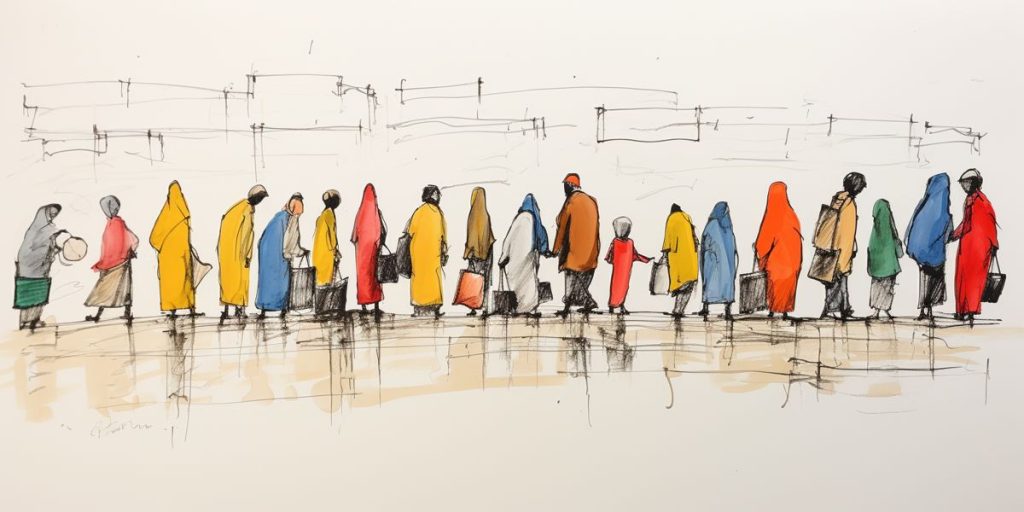The state of the refugee policy is currently under scrutiny due to a €20 million budget cut from the Equal Distribution of Burden Agency (FIKV) by the Christodoulides government. This reduction could decrease the Agency’s ability to approve new applications for interest rate subsidization and support people through its programs such as housing loans, student loans, and medical loans. The situation is further complicated by the lack of a comprehensive state refugee policy, leading to increased uncertainty and instability for refugees.
What is the current state of the refugee policy and its implications?
The state of the refugee policy is currently under scrutiny due to a €20 million budget cut from the Equal Distribution of Burden Agency (FIKV) by the Christodoulides government. This reduction could decrease the Agency’s ability to approve new applications for interest rate subsidization and support people through its programs such as housing loans, student loans, and medical loans. The situation is further complicated by the lack of a comprehensive state refugee policy, leading to increased uncertainty and instability for refugees.
In a time of rising interest rates and socio-economic turmoil, the Christodoulides government has made a controversial move. It has curtailed the budget, slashing 20 million euros from the Equal Distribution of Burden Agency (FIKV). This decision has elicited strong protests from figures within the Agency and the political sphere.
FIKV Budget Cut Amid Rising Interest Rates
The president of FIKV, Akis Pouros, and AKEL MP Christos Christofides have condemned this budget cut vehemently. They argue that such a step is unwise, especially when the Agency requires state support. The deputy president of PEP, Christos Alekou, also expressed surprise at this decision. He contended that given the wide appreciation for the Agency’s work, one would expect it to receive necessary support from the State.
Pouros disclosed that FIKV had proposed changes to its existing programs, given the socio-economic conditions and the applicants’ needs. Their recommendations, which included measures like increasing housing loans, removing income criteria, and raising residence fees for student loans, were sent to the Ministry of Finance. Despite approval, however, these suggestions have not been forwarded to the Legal Service to address the pertinent issues.
The Effects of the Budget Cut
The budget reduction has serious implications, claims AKEL MP Christos Christofides. He stresses that the Agency would struggle to cope with subsidizing the already approved interest rates. As a result, it might significantly reduce its ability to approve new applications for interest rate subsidization.
Christofides also highlighted the broader consequences of this budget cut. Beyond housing loans, the Agency also provides student loans and loans for medical purposes. Thus, the government is indirectly reducing the Agency’s capacity to support people through its programs at a time when they need it the most.
Moreover, Christofides expressed astonishment at the government’s failure to recognize the real economic data. As interest rates rise, the amount funded by the Agency also increases. He pointed out the fallacious logic of the government in justifying the budget cut due to less than 100% implementation of the funds.
Criticism of Government Stance
PEP Vice President Christos Alekou also criticised the government’s stance. He stated that the Agency’s work had always been commended in the Parliamentary Refugee Committee discussions. Given this praise, it was reasonable to expect that the State would provide the necessary support to the Agency.
Instead, Alekou revealed that the government reduced the FIKV budget by twenty million in the 2024 budget. The budget had remained stagnant for eleven consecutive years since 2012. He lamented the fact that the Agency’s constant request for increased staffing had been met with not only a lack of response but a decrease in personnel through secondments.
The Lack of a Comprehensive Refugee Policy
In the midst of these budgetary and staffing challenges, the most significant issue remains the absence of a comprehensive state refugee policy. Both Pouros and Christofides agree that there are only disjointed individual actions without a specific plan. This lack of a cohesive policy has left refugees in a limbo, leading to increased uncertainty and instability.
The refugee policy that was once in place has been dismantled, leaving the Agency to face these challenges alone. As Alekou noted, the government seems uninterested in addressing the real problems of refugees in today’s conditions. This apathy is evident in their refusal to discuss the Agency’s proposals for addressing the current socio-economic needs and conditions.
In conclusion, with the budget cuts and absence of a comprehensive refugee policy, the future of refugees and the Agency’s ability to support them appears precarious. The government’s action and inaction have stirred controversy and elicited strong criticism, setting the stage for a tumultuous period ahead for the Agency and the refugees it serves.
The refugee policy is currently being questioned because the government has cut €20 million from the agency that helps distribute resources to refugees. This budget cut could make it harder for the agency to help people with things like loans for housing, education, and medical expenses. The lack of a clear and comprehensive refugee policy from the government is also causing more uncertainty and instability for refugees. Many people are criticizing the government’s decision and its failure to support the agency and address the needs of refugees.Overall, this situation is making it harder for refugees to get the help they need and causing a lot of controversy.

